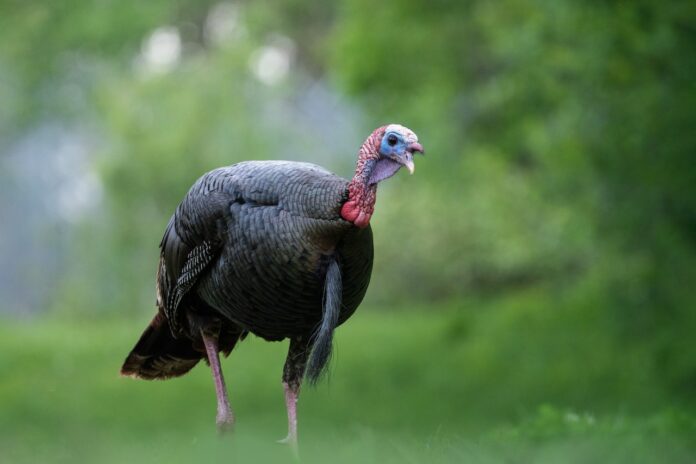The New Hampshire Fish and Game Department is asking for the public’s help by reporting wild turkey brood sightings in New Hampshire this spring and summer. It’s easy to participate and the survey is now open. If you observe groups of turkeys with poults (juvenile birds) between June 1 and August 31, report your sightings on NH Fish and Game’s web-based Turkey Brood Survey by visiting https://forms.gle/LT7oewbq6Cx9hPGSA.
“The information participants provide helps us monitor the turkey population,” said NH Fish and Game Turkey Project Leader Allison Keating. “This survey results in reports from all over the state and adds to the important information biologists gather to monitor the distribution, abundance, and productivity of wild turkeys.” In 2022, Summer Brood Survey participants reported seeing 1,094 broods with an average of 3.22 poults per hen, which is an increase compared with the previous year when 2.95 poults per hen were reported. The highest average on record was 4.38 poults per hen reported during 2011, which was the first year of the survey.
The term “brood” refers to a family group of young turkeys accompanied by a hen. New Hampshire hens generally begin laying eggs from mid-April to early May and complete their clutch of about 12 eggs in early to mid-May. Incubation lasts for 28 days, and most eggs hatch from late May to mid-June. If incubating turkey eggs are destroyed or consumed by predators, hens often lay a replacement clutch of eggs that hatch late July through late August. Reports of adult male turkeys are not being requested at this time.
Many factors can affect turkey productivity in any given year. Young turkey chicks are extremely sensitive to cool temperatures and rain, both because it can affect their health and because these conditions can adversely impact insect populations which are a critical source of nutrition for young turkeys. Since spring weather is highly variable, survival of the annual hatch of wild turkeys is also highly variable.
A large annual influx of young turkeys is needed to sustain populations over time, so the number of young turkeys that survive to be “recruited” into flocks in the fall is of great interest to turkey managers. A large sample of turkey brood observations collected throughout the summer provides an insight into the size of the “graduating class” of turkeys that will go on to become adults.
To learn more about the survey, visit www.wildnh.com/surveys/turkeybrood.html.
Wildlife turkey management and research is made possible by the U.S. Fish and Wildlife Service Wildlife Restoration Program, a user-pay, user-benefit program supported by purchases of firearms, ammunition, and archery equipment.
